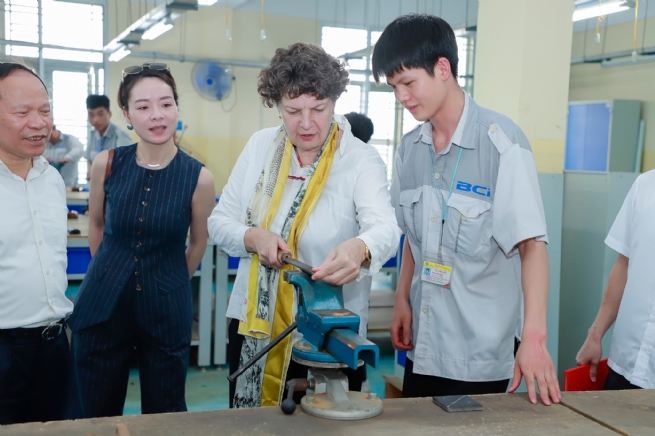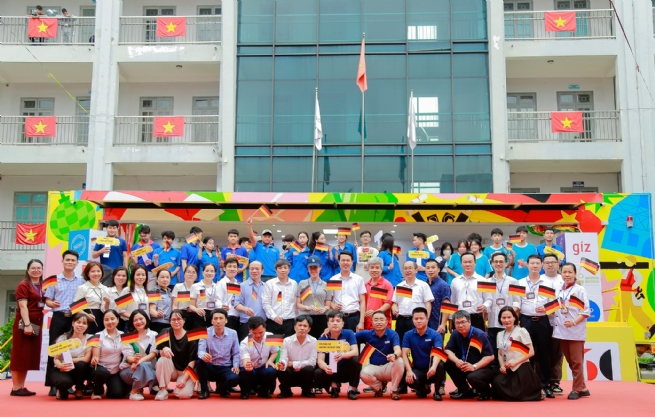Through steady cooperation with German organizations and enterprises including the Deutsche Gesellschaft für Internationale Zusammenarbeit (GIZ) GmbH and the German Chambers of Commerce Abroad (AHK), Bac Ninh Industrial College (BCI) has successfully established a German-standard dual training model, delivering practical benefits for students, businesses, and society. To learn more about BCI’s success story, our reporter interviewed Dr. Vu Quang Khue, Rector of the college.

Ambassador Helga Margarete Barth visits the high-tech workshop at Bac Ninh Industrial College
When did the cooperation between BCI and German partners begin, and what are the milestones in this process?
The cooperation between BCI and German partners is not a single occasion but a long-term strategy initiated more than 10 years ago with the aim of raising vocational education to international standards.
The first milestone was the signing of the agreement in 2008 between the Vietnamese and German governments to implement the Program Vocational Training 2008 (PVT 2008). This created the basis for us to approach the philosophy, methods, and standards of German vocational training.
The next turning point came with the comprehensive support from the German government through GIZ, covering infrastructure investment, teacher capacity building, digital transformation, green transition, and business cooperation. Since then, our training model has moved from “teaching what we have” to “training exactly what businesses need.”
Most importantly, recognition from AHK stands as the strongest evidence of BCI’s training quality, confirming that its graduates fully satisfy the high standards of the international labor market.
Which fields currently apply the dual training model at BCI, and what are its key differences and advantages compared to traditional training?
BCI is now applying the dual training model in two key technical fields: Industrial Electronics and Metal Cutting. These are sectors where German enterprises in Vietnam have strong demand for skilled workers.
The main distinction of this model is its “three-stakeholder benefit” approach: students gain practical learning; businesses engage directly in training; and the college raises education quality.
Students spend up to 70% of their time practicing at enterprises from the first year, earn salaries during their studies, and almost always secure jobs after graduation.
Businesses help design curricula, give technical guidance, and assess results, enabling them to hire workers who are “job-ready.”
For the college, this model allows rapid updates on business needs, ensures training aligns with the labor market, and contributes to addressing the shortage of skilled technical workers for the province and local industrial zones.
How has cooperation with partners like GIZ and Siemens specifically impacted BCI’s teaching quality and students’ practical skills?
The cooperation with organizations and enterprises has brought a real breakthrough in our quality, strongly influencing two main pillars: the teaching staff and students’ competencies.
For lecturers, this cooperation has shifted them from being simple conveyors of knowledge to trainers of practical skills. They work directly with German experts and stay updated with the latest technologies, ensuring lessons are always linked to real production.
For students, they not only gain technical skills but also develop the mindset and working style of global technicians. Working in strategic enterprises builds discipline, precision, teamwork, and the ability to handle work pressure - soft skills that no textbook can provide.

“German Career Truck” brings Germany’s education and career opportunities to young people at Bac Ninh Industrial College
Recently, BCI co-organized the “German Career Truck” in Bac Ninh province. How do you assess the significance of this event?
The “German Career Truck” event in Bac Ninh was both successful and meaningful. Held as part of the 50th anniversary of Vietnam-Germany diplomatic relations, it aimed to highlight the story of effective cooperation between the two countries and bring it closer to the community, especially the youth.
For students, the event demonstrated that their current training program is a direct outcome of strong bilateral collaboration. This fosters pride and strengthens their confidence in the career path they have chosen.
For the college and partners such as GIZ and German enterprises, it provided a chance to review and recognize the concrete results of their joint efforts in high-quality vocational training.
I believe this event marks an important beginning, opening opportunities for deeper cooperation in the future.
With the wave of German investment in Vietnam, what role will BCI play in training and supplying high-quality technicians that meet international standards?
Amid this new investment wave, BCI defines its role not only as a training institution but also as a strategic partner and a human resource solutions center for German investors. We strive to go one step ahead, working closely with businesses to anticipate and develop training programs for future skills such as automation, smart manufacturing, and green energy.
We function as a “customized system,” flexibly adjusting to meet even the most specific workforce needs.
Our central mission is to help investors reduce human resource risks, transform Bac Ninh’s abundant labor force into a strategic advantage, and ensure that when they choose to invest, they already have a reliable partner to address the workforce challenge.
What message would you like to deliver to the business community, partners, and Vietnamese readers?
The message BCI wishes to deliver to the business community, partners, and readers in Vietnam can be expressed in three words: Cooperation, Quality, Future.
To enterprises, we aim to be your strategic partner in investment plans in Vietnam, committed to providing a workforce with German quality from Vietnamese talent.
To young people and parents, we emphasize that vocational training to international standards is not a second choice but a practical and sustainable career path in the era of integration.
Today’s cooperation shapes tomorrow’s quality, and together, we will create a prosperous future.
Thank you very much!
By Quynh Ngoc , Vietnam Business Forum